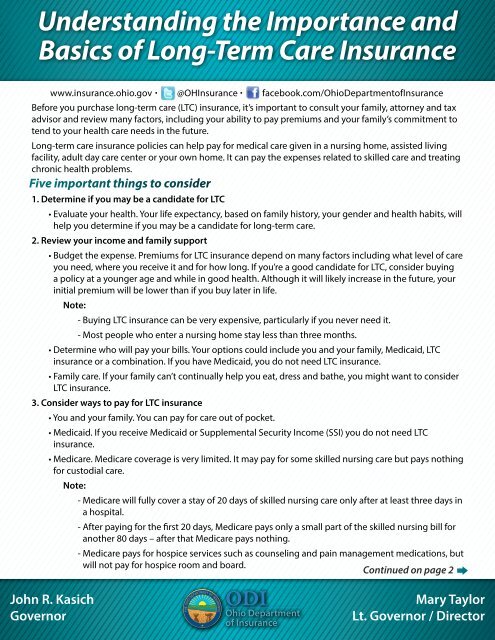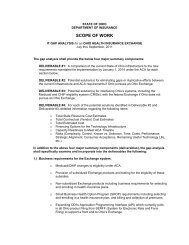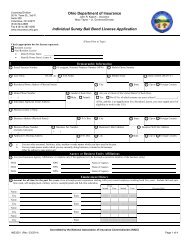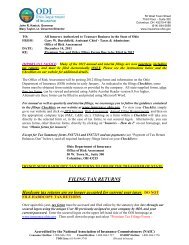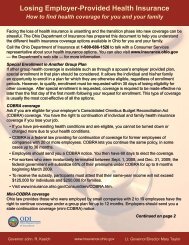The Basics of Long-Term Care Insurance - Ohio Department of ...
The Basics of Long-Term Care Insurance - Ohio Department of ...
The Basics of Long-Term Care Insurance - Ohio Department of ...
You also want an ePaper? Increase the reach of your titles
YUMPU automatically turns print PDFs into web optimized ePapers that Google loves.
Understanding the Importance and<br />
<strong>Basics</strong> <strong>of</strong> <strong>Long</strong>-<strong>Term</strong> <strong>Care</strong> <strong>Insurance</strong><br />
www.insurance.ohio.gov · @OH<strong>Insurance</strong> · facebook.com/<strong>Ohio</strong><strong>Department</strong><strong>of</strong><strong>Insurance</strong><br />
Before you purchase long-term care (LTC) insurance, it’s important to consult your family, attorney and tax<br />
advisor and review many factors, including your ability to pay premiums and your family’s commitment to<br />
tend to your health care needs in the future.<br />
<strong>Long</strong>-term care insurance policies can help pay for medical care given in a nursing home, assisted living<br />
facility, adult day care center or your own home. It can pay the expenses related to skilled care and treating<br />
chronic health problems.<br />
Five important things to consider<br />
1. Determine if you may be a candidate for LTC<br />
• Evaluate your health. Your life expectancy, based on family history, your gender and health habits, will<br />
help you determine if you may be a candidate for long-term care.<br />
2. Review your income and family support<br />
• Budget the expense. Premiums for LTC insurance depend on many factors including what level <strong>of</strong> care<br />
you need, where you receive it and for how long. If you’re a good candidate for LTC, consider buying<br />
a policy at a younger age and while in good health. Although it will likely increase in the future, your<br />
initial premium will be lower than if you buy later in life.<br />
Note:<br />
- Buying LTC insurance can be very expensive, particularly if you never need it.<br />
- Most people who enter a nursing home stay less than three months.<br />
• Determine who will pay your bills. Your options could include you and your family, Medicaid, LTC<br />
insurance or a combination. If you have Medicaid, you do not need LTC insurance.<br />
• Family care. If your family can’t continually help you eat, dress and bathe, you might want to consider<br />
LTC insurance.<br />
3. Consider ways to pay for LTC insurance<br />
• You and your family. You can pay for care out <strong>of</strong> pocket.<br />
• Medicaid. If you receive Medicaid or Supplemental Security Income (SSI) you do not need LTC<br />
insurance.<br />
• Medicare. Medicare coverage is very limited. It may pay for some skilled nursing care but pays nothing<br />
for custodial care.<br />
Note:<br />
- Medicare will fully cover a stay <strong>of</strong> 20 days <strong>of</strong> skilled nursing care only after at least three days in<br />
a hospital.<br />
- After paying for the first 20 days, Medicare pays only a small part <strong>of</strong> the skilled nursing bill for<br />
another 80 days – after that Medicare pays nothing.<br />
- Medicare pays for hospice services such as counseling and pain management medications, but<br />
will not pay for hospice room and board.<br />
Continued on page 2 <br />
John R. Kasich<br />
Governor<br />
Mary Taylor<br />
Lt. Governor / Director
<strong>Long</strong>-<strong>Term</strong> <strong>Care</strong> <strong>Insurance</strong> <strong>Basics</strong> Page 2<br />
• Check with your employer. A growing number <strong>of</strong> companies make LTC coverage available for<br />
employees to purchase for themselves and family members.<br />
• Military veteran benefits. Your level <strong>of</strong> care will depend on the nature <strong>of</strong> the disability or illness.<br />
Note:<br />
- Military veterans with service-related disabilities or illnesses may qualify for care at a Veterans<br />
Affairs (VA) facility or a private nursing home at VA expense.<br />
- Veterans not afflicted with complications from being in the service can receive care in a VA<br />
facility if space and resources permit.<br />
- Those with a specific income level must pay a deductible and a co-payment.<br />
4. Know the places where you can receive care<br />
• Your insurance policy determines where it will pay for covered benefits. <strong>Care</strong> is usually delivered in<br />
nursing homes, adult day care centers, assisted living facilities and/or in your home and policies may<br />
cover care in all four settings.<br />
5. Know when your coverage starts<br />
• Policies have “triggers” to determine when your physical or mental condition has reached a point<br />
where you are entitled to benefits.<br />
• <strong>The</strong> inability to perform a certain number <strong>of</strong> “activities <strong>of</strong> daily living” (eating, bathing, dressing,<br />
toileting, continence and transferring) or if you have been diagnosed with cognitive impairments such<br />
as Alzheimer’s or dementia.<br />
What’s new: <strong>Ohio</strong> Partnership Policies<br />
<strong>Ohio</strong> <strong>Long</strong>-term <strong>Care</strong> Partnership Policies allow you to buy LTC insurance, receive benefits from the policy<br />
and protect a matching amount <strong>of</strong> assets if you continue to need LTC and apply for Medicaid.<br />
<strong>Ohio</strong> encourages those at risk who can afford LTC insurance to consider buying this type <strong>of</strong> policy.<br />
How do these policies work<br />
You pay premiums as you would with any insurance contract. If needed, you use policy benefits to pay<br />
for covered care. You receive benefits as long as you need care and do not exhaust the coverage your<br />
premiums bought. <strong>The</strong>n, you can protect some <strong>of</strong> your assets should you continue to need care and apply<br />
for Medicaid.<br />
<strong>Ohio</strong> partnership policies must meet several requirements, including:<br />
• <strong>The</strong> policy must be issued after Sept. 10, 2007.<br />
• <strong>The</strong> insured must be a resident <strong>of</strong> <strong>Ohio</strong> when coverage first becomes effective.<br />
• <strong>The</strong> policy must be a federally tax-qualified plan based on the Internal Revenue Service Code.<br />
• <strong>The</strong> policy must meet strict consumer protection standards, including protection against inflation.<br />
How much can I protect<br />
For every dollar you use in benefits, you can protect a dollar <strong>of</strong> your assets if you later apply for Medicaid.<br />
You can protect assets up to the total amount <strong>of</strong> the coverage you buy. A partnership policy helps you plan<br />
for your LTC expenses while protecting a portion <strong>of</strong> your assets.<br />
Continued on page 3 <br />
John R. Kasich<br />
Governor<br />
Mary Taylor<br />
Lt. Governor / Director
<strong>Long</strong>-<strong>Term</strong> <strong>Care</strong> <strong>Insurance</strong> <strong>Basics</strong> Page 3<br />
Example: You receive $50,000 in benefits from an <strong>Ohio</strong> LTC Partnership policy. You’ll be able to protect<br />
$50,000 in assets should you require further care and apply for Medicaid.<br />
Please note: Buying and using a partnership policy does not guarantee you will be otherwise eligible<br />
for Medicaid.<br />
Will the policy protect me better than non-partnership LTC policy<br />
As with any insurance policy, it is important to choose the type <strong>of</strong> coverage that fits your needs. If you<br />
exhaust the benefits <strong>of</strong> a non-partnership policy and still need care, you would have to “spend down” your<br />
assets to Medicaid eligibility levels. Medicaid would then pay your long-term care bills.<br />
A partnership policy protects assets matching the amount <strong>of</strong> benefits you received from the policy. If the<br />
protected amount is less than your remaining assets, you would have to pay for your care until you spend<br />
down to Medicaid eligibility levels before Medicaid starts paying your long-term care bills.<br />
Shopping tips for LTC insurance<br />
• Take the time to shop around and conduct research. Visit websites and read material that will educate<br />
you on LTC products. Call the <strong>Ohio</strong> <strong>Department</strong> <strong>of</strong> <strong>Insurance</strong>'s OSHIIP program at 1-800-686-1578 with<br />
any questions. Also talk with an agent to determine what coverage would best meet your needs.<br />
• Remember that your age, type <strong>of</strong> benefit, daily benefit amount and benefit period are all factors that<br />
impact your premium.<br />
• If you already have a LTC policy, do not cancel it until your new one is in effect.<br />
• Familiarize yourself with the policy’s “elimination period” (also called “deductible period”). This is<br />
the number <strong>of</strong> days you will pay your own nursing home or home health care bills before insurance<br />
payments start. Elimination periods vary in length by policy. <strong>The</strong> longer the period, the lower your<br />
premium amount may be.<br />
• Understand the policy’s “benefits period,” which describes how long the policy will pay benefits (i.e.,<br />
one year, four years, five years or lifetime).<br />
• Know the maximum the policy will pay for your care each day. A larger daily benefit will have a higher<br />
premium.<br />
• Ask about “inflation protection” to keep your future costs down.<br />
• Every insurance policy has a list <strong>of</strong> things that are not covered. Make sure you know what they are.<br />
• Be sure to save any paperwork regarding your insurance policy. Save receipts, policy plans, an outline<br />
<strong>of</strong> coverage, riders, endorsements and agreements.<br />
Where to go for help<br />
Unbiased information on the effects long-term care can have on your finances is available by calling the<br />
<strong>Department</strong>’s OSHIIP program at 1-800-686-1578. You can also find long-term care information online at<br />
www.insurance.ohio.gov.<br />
<strong>The</strong> <strong>Ohio</strong> <strong>Department</strong> <strong>of</strong> Job & Family Services (JFS) determines Medicaid eligibility. To learn more call<br />
1-800-324-8680 or contact the JFS <strong>of</strong>fice in your county.<br />
John R. Kasich<br />
Governor<br />
Mary Taylor<br />
Lt. Governor / Director


